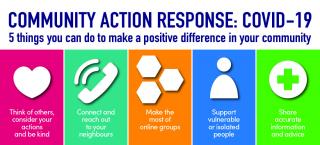Welcome to an update from the CR&DALL team on recent COVID-19 activities involving members of the School of Education here at the University of Glasgow. We have been involved in initiatives at local, national, and international levels with a range of partners including academics, public and private sector stakeholders, third sector groups, and perhaps most importantly local communities. We are also working at varying scales with micro-interventions at the level of the individual; meso-interventions at the community level, and macro-interventions through engagement with global partners.
- We are working with the Scottish Government to further develop a COVID-19 communications toolkit for the general public (Margaret Sutherland);
- We are using emerging evidence from national and international networks to inform and support educational leaders and policymakers to develop evidence-informed responses to the COVID-19 crisis at the city and national level. For example with the theme: Community Resilience and Addressing Disadvantage, Economics and Finance, Education, Children and Families, Housing and Infrastructure, Jobs, Labour Market and Innovation (Chris Chapman, Policy Scotland and Children’s Neighbourhoods Scotland);
- We are leading the development of a global network with the Bernardo O’Higgins University, Pontifical Catholic University of Chile in Valparaíso and Santiago in Chile and the Free University of Amsterdam in the Netherlands, in partnership with the International Congress for School Effectiveness and Improvement (ICSEI) to share emerging research findings, and move knowledge and emerging practices around the world – (Chris Chapman, Policy Scotland);
- We have written thought pieces related to COVID-19 as follows:
- Supporting resilient learning in the face of COVID-19 (Yulia Nesterova, Centre for Sustainable, Healthy, Learning Cities and Neighbourhoods – see http://pobs.cc/1oync;
- Mitigating feelings of loneliness, and preserve our sense of connectedness, during isolation. (Catherine Lido on PASCAL Observatory – see http://pobs.cc/1oyrc;
- Participation in adult education and the pandemic: Who is missing out? (Ellen Boeren);
- COVID-19 and the Future of Adult Education: An AEQ Editorial (Ellen Boeren et al).
- We are making contributions to an initiative from the University of Florence: Research and practices to reach a sustainable and healthy economic and social recovery post-COVID-19. PASCAL’s learning Cities Network will lead themes on cities and communities (Mike Osborne), cultural engagement (Catherine Lido), and spirituality and faith (Margaret Sutherland). See http://pobs.cc/1om09;
- We have made a contribution to UNESCO Institute for Lifelong Learning webinar on university responses to COVID 19 – (Mike Osborne, see https://uil.unesco.org/unesco-learning-cities-responses-covid-19-outcomes-webinar-15-april);
- The EcCoWell2 Community Recovery Program is being launched by PASCAL shortly in partnership with Cork Learning City, Wolverhampton City Learning Region, Wyndham Learning City, Harlem New York Learning Neighbourhood, Datong Taipei Learning Neighbourhood, Beijing Academy of Social Sciences, and the City of Cotonou, Benin;
- There is a range of news items on CR&DALL and PASCAL sites from around the world:
- Don't Waste A Crisis (Part One) - Fondation pour l'Innovation Politique (FONDAPOL) – Josef Konvitz - http://pobs.cc/1ou73;
- PASCAL International Members Association (PIMA) Webinar #2 | Adult Learning and Education (ALE), Climate Crises and COVID-19: Critical Reflections from Australia - http://pobs.cc/1om3y;
- Handbook on Facilitating Flexible Learning During Educational Disruption: The Chinese Experience in Maintaining Undisrupted Learning in COVID-19 Outbreak - http://pobs.cc/1olxv;
- Forum d'actualité CMAtlv: COVID19 http://pobs.cc/1oy1y;
- A section on pandemics is being included in a guide on cultural intervention in times of crisis for Latin America. The section includes advice on implementation and issues of concern as well as activities around literature and the arts during health crises. The guide, commissioned by The Regional Center for the Promotion of Books in Latin America and Caribbean (Cerlalc) which sponsored by UNESCO, will be published in June in Spanish under the title: La Fuerza de las Palabras: Estrategias de Intervención Cultural en Contextos de Crisis y Emergencia (Lavinia Hirsu, Julie McAdam and Evelyn Arizpe);
- Staff and students within the Community Development area of the school are contributing extensively to supporting their communities in a range of ways, including:
- facilitating weekly Mindfulness group sessions for staff and their families;
- providing emotional support to volunteers in NGOs through check-in chats, referral information and, in some cases, financial support;
- a wide range of volunteering activities, including students who are involved in various community initiatives such as providing food for families in areas of high deprivation and supporting drug addiction help groups (Sinead Gormally);
- PhD Student, Barry Black, from the Urban Big Data Centre was interviewed on Radio Scotland on 21 April to discuss what lockdown may mean for educational inequality in Scotland. See https://tinyurl.com/gmsld;
- The St Andrew’s Foundation is offering daily Religious Education tasks and activities for primary and secondary pupils (via Twitter and Facebook) (Roisin Coll);
- The School has loaned 33 iPad minis to Wishart General Hospital after receiving an SoS at the weekend from a respiratory consultant. These are being used in end-of-life situations to communicate with family and loved ones (Margery McMahon);
- Staff are involved in cooking hot meals and preparing sandwiches for the homeless that are uplifted every weekend (Mary Lappin and Gabriela Rodolicco).
We shall of course continue to keep you updated.
Stay safe.
Muir Houston
Mysneakers | NIKE HOMME
- Log in to post comments














Latest Comments